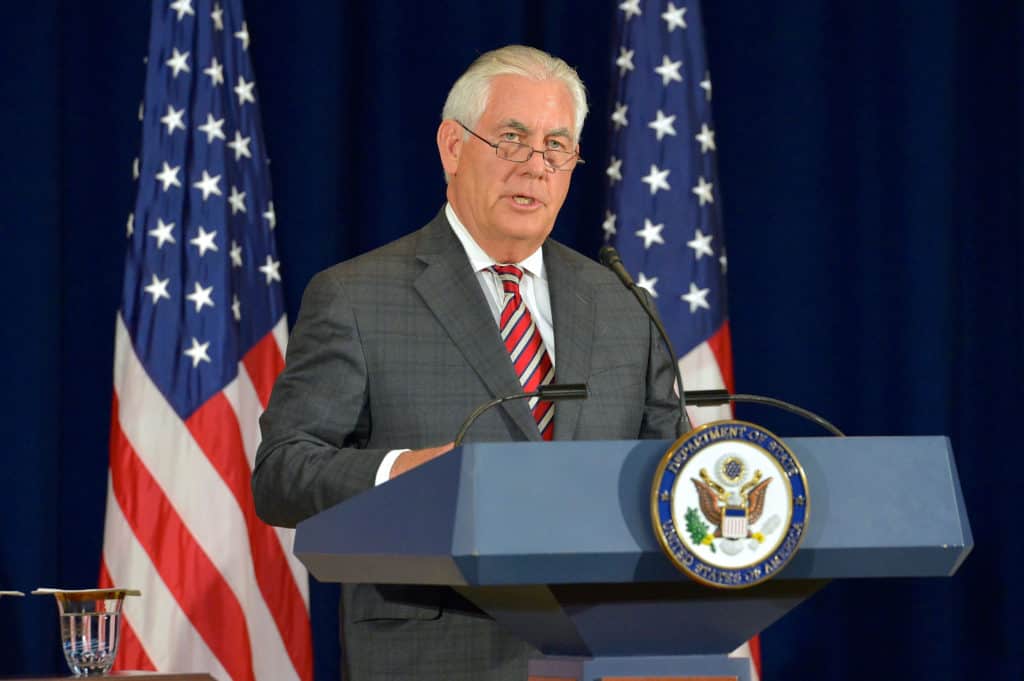Rex Tillerson: Risk of ‘Open Conflict’ if US-China Relations Continue to Grate
Tom Phillips, The Guardian, August 1, 2017

Secretary of State Rex Tillerson speaks to the media following the inaugural U.S.-China Diplomatic and Security Dialogue at the State Department in Washington, DC. (Credit Image: © Glen Johnson/Planet Pix via ZUMA Wire)
Relations between the United States and China have reached “a pivot point”, Rex Tillerson has warned, calling for efforts to avoid “open conflict” between the world’s two largest economies.
At a rare state department briefing held amid reports that Donald Trump waspreparing to order a wide-ranging investigation into Chinese trade practices, the US secretary of state told reporters that ties were at a crossroads following “a long period of no conflict” that had lasted more than four decades.
Experts believe Trump had hoped to strike “grand bargain” with Xi Jinping by which he would have given the Chinese president a pass on issues such as trade or its controversial South China Sea island-building campaign in exchange for cooperation on North Korea. But after initially positive signs, such as a two-day summit at Trump’s Mar-a-Lago estate, the relationship appears to be souring.
Tillerson said the question now was: “How should we define this relationship [with China] and how do we ensure that economic prosperity to the benefit of both countries and the world can continue, and that where we have differences – because we will have differences, we do have differences – that we will deal with those differences in a way that does not lead to open conflict?
“We test this relationship through things like the situation in North Korea,” he went on, referring to Trump’s so far fruitless attempts to persuade Beijing to help rein in Kim Jong-un.
“Can we work together to address this global threat where we have a common objective? And where we have differences – in the South China Sea, and we have some trading differences that need to be addressed – can we work through those differences in a way without it leading to open conflict and find the solutions that are necessary to serve us both?”
Orville Schell, the head of the centre on US-China relations at New York’s Asia Society, said Tillerson’s comments were “a polite way of saying that we are increasingly estranged”. After decades of US engagement with the world’s most populous nation following the re-establishment of ties by Richard Nixon and Mao Zedong in 1972, “now there are a number of signals that suggest we may be ineluctably on diverging paths”.
Trump attacked China on Twitter on Saturday claiming his “foolish” predecessors had “allowed them to make hundreds of billions of dollars a year in trade” while they did “NOTHING” to thwart North Korea’s nuclear ambitions.
Chinese state media hit back in unusually robust language, condemning Trump’s inflammatory and “emotional venting”.
Tensions look set to further intensify this week with multiple reports suggesting Trump is preparing to hit back against what he views as Beijing’s unfair trade practices – and its failure to cooperate on North Korea – by launching a so-called ‘Section 301’ investigation.
The New York Times reported that the inquiry would focus on alleged Chinese violations of American intellectual property and could lead to steep tariffs being imposed on Chinese imports or licenses for Chinese companies operating in the US being rescinded.
Trump’s commerce secretary, Wilbur Ross, vowed in the Wall Street Journal on Tuesday, in an article partly aimed at China, to “use every available tool to counter the protectionism of those who pledge allegiance to free trade while violating its core principles.”
The first high-level economic talks between the US and China since Trump took power – the US-China Comprehensive Economic Dialogue (CED) – ended in deadlock in late July with officials failing to agree a joint statement and scrapping a press conference.
Schell said numerous issues on which Trump had hoped to see a “friendly resolution” – North Korea and trade among them – were now “festering into a state of increased antagonism” between the US and China.
“If they could have found some convergence, I think Xi would have walked away with the South China Sea, there wouldn’t have been any trade war, there would be no comment on Hong Kong or Taiwan. But he missed that one and now we see Trump starting to turn on him.
“I think we are at more than a tipping point, I think we are at a turning point . . . . If you don’t see evidence that engagement is efficacious, then you have to say: ‘OK, then what? Are we back in the Cold War? Where are we?’”















